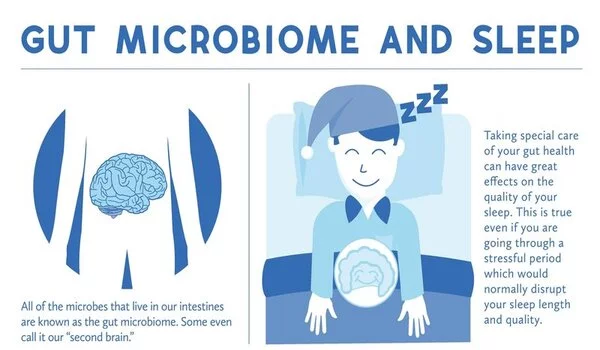The circadian rhythm is an internal clock in the human body that governs many physiological processes such as sleep-wake cycles and digestion. Circadian rhythm disruptions, such as irregular sleep patterns caused by shift work or jet lag, can have an impact on the gut flora. Changes in eating habits and meal timing might result from irregular sleep patterns. Changes in dietary habits can have an impact on the composition of the gut microbiota. Late-night eating, for example, may influence the types of bacteria that thrive in the stomach.
According to new research, irregular sleep patterns are linked to dangerous microorganisms in the stomach. The study, published in The European Journal of Nutrition by researchers from King’s College London and ZOE, the personalized nutrition company, is the first to discover multiple associations between social jet lag and diet quality, diet habits, inflammation, and gut microbiome composition in a single cohort.
Working shifts has been found in previous studies to disrupt the biological clock and raise the risk of weight gain, cardiac problems, and diabetes. However, there is less awareness that modest discrepancies in sleeping patterns, such as waking up early with an alarm clock on workdays versus waking up naturally on non-workdays, might impact our biological rhythms.
Sleep is a key pillar of health, and this research is particularly timely given the growing interest in circadian rhythms and the gut microbiome. Even a 90-minute difference in the middle of the night can increase microbiota species that are harmful to your health.
Kate Bermingham
“We know that major disruptions in sleep, such as shift work, can have a profound impact on your health,” said senior author Dr Wendy Hall of King’s College London. This is the first study to indicate that even minor changes in sleep timings over the course of a week appear to be associated to variances in gut bacterial species.
Some of these relationships were connected to dietary changes, but our data also suggests that other, as-yet-unknown, factors may be at work. We need intervention trials to see if improved sleep time consistency leads to favorable changes in the gut microbiome and related health outcomes.
“The composition of the microbes in your gut (microbiome) may negatively or positively affect your health by producing toxins or beneficial metabolites.” Specific microbe species can correspond to an individual’s risk of long-term health issues such as diabetes, heart disease, and obesity. The microbiome is influenced by the food you eat, making the variety of your gut changeable.

Researchers examined blood, stool, and gut microbiota samples, as well as glucose readings, in those whose sleep was irregular to those who maintained a typical sleep schedule in a cohort of 934 persons from the ZOE PREDICT trial, the biggest continuing nutritional study of its kind. Previous research on the relationship between social jet lag and metabolic risk factors has been done in populations with obesity or diabetes, but this cohort was mostly slim and healthy, with most obtaining more than seven hours of sleep per night during the week.
Researchers discovered that a 90-minute change in the timing of the midpoint of sleep – the time between sleep and wake-up – is connected with variances in gut microbiota makeup. Social jet lag was linked to lower overall food quality, higher use of sugar-sweetened beverages, and lower consumption of fruits and nuts, all of which may have an impact on the abundance of certain bacteria in your gut.
Three of the six microbiota species that are more common in the social jet lag group have ‘unfavorable’ health implications. These microorganisms are linked to poor diet quality, obesity and cardiometabolic health indicators, and blood markers linked to increased levels of inflammation and cardiovascular risk.
“Sleep is a key pillar of health, and this research is particularly timely given the growing interest in circadian rhythms and the gut microbiome,” said first author Kate Bermingham, PhD, of King’s College London and senior nutrition scientist at ZOE. Even a 90-minute difference in the middle of the night can increase microbiota species that are harmful to your health.”
Previous study has linked social jetlag to weight gain, chronic illness, and mental tiredness.
Dr. Sarah Berry from King’s College London and chief scientist at ZOE added: “Maintaining regular sleep patterns, so when we go to bed and when we wake each day, is an easily adjustable lifestyle behavior we can all do, that may impact your health via your gut microbiome for the better.”
















